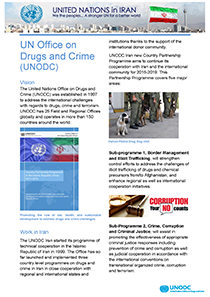Training Workshop on Motivational Interviewing for Women Drug Users
|
|
Tehran, 01 November 2022- Motivational Interviewing (MI) is an evidence-based behavioural therapy which has been proven to be a very effective therapeutic approach in combination with treatment plans for substance use disorders. Its unique method by highlighting the collaboration and relying on 4 main processes of engaging, focusing, evoking, and planning makes it a distinctive approach that increases motivation for change. The evidence shows that both the urge to use substances and reported likelihood of using in tempting situations (increased self-efficacy) especially in women who have received treatment along with motivational interviewing significantly have been decreased. This approach is especially important in the context of women drug users. With an estimated number of 156,000 women with drug use disorders in Iran, the stigma attached to being a drug user, unaffordable financial costs of treatment, lack of family and social support for encouraging treatment entry as well as the fear of losing custody of children makes the situation of drug use disorders among women different from men and calls for a more specific approach to the treatment of women drug users.
The United Nations Office on Drugs and Crime in Iran in cooperation with the Drug Control Headquarters (DCHQ), and coordination with the Ministry of Health, Treatment and Medical Education and the State Welfare Organization has organized a three-day in-person training workshop on “Motivational Interviewing for Women Drug Users”, in Tehran on 1 - 3 November 2022. The training is facilitated by Dr. Setareh Mohsenifar, psychiatrist and former UNODC Iran expert, who is a certified TreatNet trainer. Dr Mohsenifar has developed the training manuals which was used in the training workshop.
The training workshop brought together experts from the Ministry of Health, psychologists, and experts from harm reduction centres from Tehran, Alborz, and Kerman to further discuss and learn about female drug users and the barriers to entering or remaining in treatment, change and its models, 4 processes of MI, as well as a special session to focus on female drug users with HIV/AIDS and pregnant female drug users. The workshop provided the opportunity for participants to work in groups on various exercises to learn, share and discuss ideas and experiences on the training concepts.
|
|
The workshop was opened by Dr. Majid Ghorbani, the Director General for Treatment and Social Support of the DCHQ. In his speech Dr. Ghorabani highlighted the core component of MI being “change”. He referred to the importance of using psychosocial intervention in drug use treatment and hoped that such training would increase the circle of experts with knowledge of MI. Next, the message from the UNODC Iran Representative, Mr. Alexander Fedulov, was read by Dr. Gelareh Mostashari, the Drug Demand Reduction Senior Expert of UNODC Iran. His message highlighted the commendable treatment services developed in Iran provided to approximately one million drug-dependent individuals annually. He stated that this training workshop was organized taking into consideration that still a significant number in need of drug use disorders treatment are not accessing the existing services or do not adhere to treatment sufficiently, especially among women. In this context, UNODC and DCHQ have included training on Motivational interviewing to address this situation.
Through the present activity, UNODC Iran has been seeking to enhance the efforts of the Government of the Islamic Republic of Iran in responding to drug use issues among women, with gracious funding from the Kingdom of Norway.





